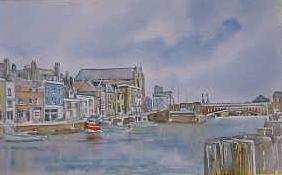the story of an unloved waif
in Weymouth Sands
by John Cowper Powys
(summarised by Ian Mulder)

She’s an unloved waif, trapped in the vacuum of a lonely middle-class existence, unsure if she’s a child or an adult. Her mother died soon after she was born. Her father is preoccupied by his business interests and secretly blames her for his widowed state. Since she was sixteen she’s been mistress of the household, but it’s a threadbare mausoleum to her mother’s memory and she’s not allowed to change anything. She’s now eighteen, and with a tiny weekly allowance, she seems to roam aimlessly, “motherless and friendless, except for a series of passionate and somewhat morbid friendships with younger boys and girls”. In her heart she is recklessly promiscuous, but a virgin in fact: we learn of a kiss from a much older man, and intense hand-holding in a darkened cinema with a younger boy. But her innocence is generally misunderstood. Her passionate friendship with a younger girl doesn’t last – Daisy finds her too wild and cynical. Jimmy Witchit, her chance acquaintance in the cinema, worries that she may be a prostitute. Only the perceptive Dr Girodel, abortionist, proprietor of a disreputable establishment (and would-be pimp?), discerns her innocence, and her eagerness to discard it in favour of experience. Gossips assume that she becomes a mistress of Sylvanus Cobbold; but in fact her devotion to the mystic is pure, and her fantasy goes no further than to be his humble servant, bringing trays up to the bed in which he lies with Marret, the Punch-and-Judy girl. Even the reclusive young philosopher, Richard Gaul, attracted initially by a distant view of her legs as she paddles in the sea, worries that he might catch a disease, when she invites him to spend the night at her house. Whether the assignation occurs or not, we never find out, as both disappear from the plot some pages before the end. Poor girl! What a fate, to be overlooked even by one's author.
“Would I let him [Cattistock] do it, if he wanted to?” she thought. “Oh, I don’t care, I don’t care, I don’t care! I don’t care what happens, as long as everything doesn’t go on repeating itself!”
Even the landscape lets her down. In her lonely childhood she had felt some special kinship with the debris-strewn tidal backwater near her house: now it has been tidied up into a neat, boring pond, no longer evoking “far horizons and remote places”.
Peg’s psyche is defined, indeed, by the unhealed wound and unsatisfied craving of her deprived upbringing. She is poised to sink into alcoholism, prostitution or suicide. Powys takes her to the brink, but ensures that she remains untouched and protected from her own desperate imaginings, her urge to self-immolation. Her story, discontinuously interwoven with all the other strands that make up Weymouth Sands, begins with a series of humiliating incidents, which culminate in her visit to Girodel’s infamous Sark House, whence she steps out into the drenching rain, with intent to throw herself in the “kindlier salt-water”.Children’s aesthetic sense is a deep half-animal feeling and when it is outraged it leaves a wound behind it that never quite heals up . . . these improvements had taken away from the lonely girl in Swan Villa something that left an unsatisfied craving in her life.
This thin-legged, flat-chested, hollow-eyed, low-browed, droopy-lipped, “pitiable figure” is found sitting all alone on a settee by the fire in Lucky Girodel’s sleazy salon, decked with old prints of Queen Victoria at public ceremonies. Weymouth’s most decadent citizens are gathered in the room, intent on drinking, gossip and immoral assignations. Dog Cattistock, her father’s business partner, brought her here, only to ignore her as soon as he discovers that dancer Tissty is for once ready to be nice to him. Girodel sidles up to Peg, using flattery and reflecting back her own thoughts about a woman’s sexual freedom, to the point where she’s ready to go with him to view the upstairs rooms. She has no illusions about what will happen up there, and passively takes his hand. Yet it is not to be, for Jerry Cobbold,
with the instinct of a born clown for certain poignant human situations; especially for such as had a touch of the grotesque, or of the pitiful, or of the tatterdemalion in them,notices the unconscious look of desperation in her eyes, and starts to clap noisily. This puts Girodel out of his mood, and he lets go of Peg’s hand, suddenly finding an urgent need to concentrate his whole being on rearranging his hair. Abandoned, Peg stands alone in the middle of the room. Even this, her sordid rendezvous with someone who reminds her of a monkey, has been snatched from her, in a public humiliation. She approaches the mantelpiece and it’s as if Queen Victoria and her bishops and statesmen, from the engraving on the wall, are joining forces with the people in the room to make Peg feel like a little street girl who’s utterly out of place. She approaches Sip Ballard and Curly Wix, but they blank her out. Jerry Cobbold only makes matters worse when, at this point, he invites her to audition as a pageboy in his show. Peg’s “clouded face lit up with the first gleam of spontaneous pleasure it had known for many a day,” to be humiliated afresh by the dancer Tossty who scornfully overrules her lover and pulls him away. But Peg’s anger quickly subsides. Her complaint is against God alone, and so she slips out of Sark House into the rain to seek oblivion—yes, suicide. This is the all-time low in her life, as she scurries “like a rabbit seeking its well-known covert, even though its hole has been stopped up”.
It always came back to the same thing: God not having made her beautiful. . . . O, if God could only once hear what she felt towards him . . . !
“The harbour would be the best place for a girl to drown herself in,” she thought.


Something in the tempo of this person’s intonation ran through her veins like the quiver of electricity.
She finds herself pulled by some magnetism downstairs, still in her night-dress. Sylvanus notices her immediately, though all kinds of commotion is happening in and around the shop, and addresses her: “Don’t catch cold, little sleeper, now you’ve come back from the Dead!” – a seemingly jocular yet prophetic utterance. For his part, Sylvanus recalls that moment later:
“What spiritual eyes and yet what vicious dissipated eyes that girl had! I must see her again. I must talk to her properly. She’d quickly give herself up to what I tell her."
The author makes clear it’s no ordinary seduction he has in mind, but a spiritual communion. And Peg finds a good friend in Marret, and is not at all jealous of the fact that she sleeps with Sylvanus, albeit innocently. While the author nowhere shows any redemptive power in Sylvanus’ brand of mysticism, it seems to support a transformation in Peg’s consciousness, and give her spiritual nourishment.
the poor lust-driven girl as her nature flowed and writhed like a passionate Sea-Undine round the glittering bodies of the naked lads
finds solace in her so far merely mental promiscuity:
“Why can’t you love just as you want to,” she thought, “just as much, just as often, and just as many? It’s supposed to be wicked. I wonder if it is. I don’t care if it is! I’d sooner go to Hell and be let do it, than go to Heaven and never do it again!”
For his part, Richard has the vice of seeing everything on earth as raw material for his philosophy. So when she asks if it’s wicked to want to look at boys all the time, he replies,
“. . . what you represent at present is the third rung of the philosophic ladder to the Contemplative Ecstasy. When you have reached the ninth rung you will find – you will lose – I mean you will gain –”
But she just wants to be taken to the theatre show, for she’s a child at heart, who likes to paddle in the sea, and be taken notice of, and invited to participate in fun. We hope she’ll be able to help Richard Gaul be a child too, as they both find redemption in simple things.
Every novelist is God over his characters, but the art of Powys is to imitate the inscrutability and particularity of life, and not impose a philosophy. As in life, the reasons and the answers are anyone’s guess. His characters are defined by their introspection and their insights into one another, not by the author’s own commentary: at least in Weymouth Sands. He gives us lots of clues about Peg, but allows the reader to decide how much attention and sympathy to give her. To sentimentalize is to force the reader’s emotion, and he doesn’t do that.
Though he describes some scenes in the minutest detail, with carefully choreographed movements, as in the scene at Sark House, he also leaves plenty to the imagination. For example, what does Peg do on an average day? Other characters are provided with a context, that gives them continuity off the page. Formally, Peg’s portrayal is faulty and unfinished, but the power and poignancy stand out all the same. Powys’ creation of Peg is not illumined by a psychological theory or a philosophy; but, as he says in the preface to Wood and Stone,
There is more hope in pursuing the truth, indirectly, and by means of the imaginative mirror of art, than directly, and by means of rational theorizing.
So let it be also in this homage to his art. I have not written as a critic, to analyze
his technique, for anyone who reads this can pick up Weymouth Sands, and see for
themselves.
© Ian Mulder 2002.
Weymouth Sands was first published in 1934 in the US. The first British edition in 1935 was entitled Jobber Skald, to avoid the risk of libel writs, a fate which had befallen his earlier novel, A Glastonbury Romance.
You can order from www.amazon.co.uk or www.amazon.com
The Wayward Isles | John Cowper Powys | Home